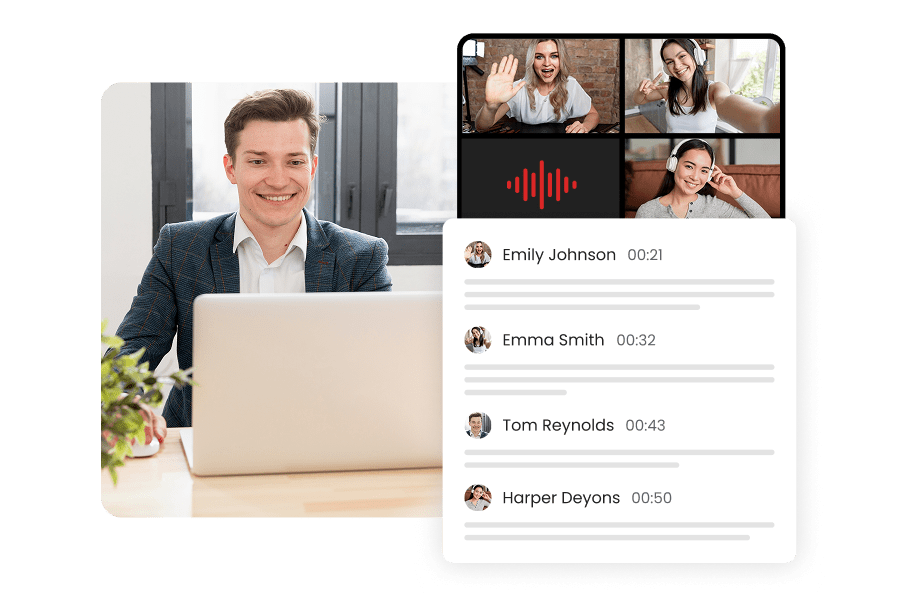Audio translator
Transcribe your audio to text and translate it into all languages
Audio to text translation
Used daily by more than 100,000 users






How to transcribe audio to text?
3 simple steps to translate your audio file

Uploading the file
Simply upload your audio file to our platform. We accept all formats to ensure audio translation.

Detect or select languages
Select the language of your recording or let the tool detect it automatically. Then choose the target language for your translation.

Receipt of the translation
Once your audio file is processed, you will receive a written transcription faithful to the original recording, translated into the language of your choice.
Why use our voice translator?
Transcri is the ideal solution for all your audio translation needs.
Automatic language detection
You don't know what language this is? Our system is capable of automatically identifying the language spoken in the audio. No more guessing whether it's Spanish, Portuguese, or Italian.
Transcription and translation in the same place
In a few minutes, our tool performs the complete transcription and then translates the text into the language of your choice. It is much faster than manually translating audio into text and then using a separate translator.
Unlimited audio translator
Our online voice translator is accessible without limitation. Do you want to translate your audio file into multiple languages? Our AI software allows you to translate the text as many times as needed.
Support for all language combinations
Our audio translator covers all popular combinations: from English to French, from Spanish to German, from Chinese to Arabic… more than 50 languages available to translate your audio file.

Online audio transcription service
Choosing our service means choosing reliability. We emphasize accuracy, speed, and efficiency. Transcri guarantees a faithful transcription, even for lower-quality audio or recordings with multiple speakers.
Our expertise does not stop at a simple speech to text transcription. We are committed to providing high-quality service accessible to everyone.

Common Uses of Audio Transcription
From journalistic interviews to educational podcasts, including conferences, the audio transcription opens up a world of opportunities. For journalists, it facilitates the citation of sources.
For researchers, it allows for in-depth textual analysis. For the general public, it makes the content more accessible.

Tips for better transcription
A good transcription starts with a quality recording. A noise-free environment, an appropriate distance from the microphone, and clear articulation are all factors that will significantly improve the final result.
And, of course, always choose a recognized transcription service for its accuracy, like ours.

The Hidden Benefits of Transcription
Beyond being a simple tool Speech to Text, the transcription offered by our tool brings numerous advantages to its users.
It increases the reach of your content, enhances listener engagement, and can even boost your online presence.
Comparison: Transcri Free vs Transcri Premium
Our tool is available in a free version and without registration. To fully exploit its potential, upgrade to the advanced version which will offer you additional features.
| Features | Free Transcription Without registration | Transcri Premium Starting from 4€ / month |
|---|---|---|
| Maximum file duration | 8 minutes | Unlimited |
| Maximum file size | 20 MB | Unlimited |
| Advanced AI model | - | |
Priority processing | - | |
Transcription editor | - | |
Multilingual translation | - | |
Bulk mode | - | |
Speaker identification | - | |
API access | - | |
Team members | - |
Languages available for audio translation
- Afrikaans🇿🇦
- Arabic🇦🇪🇸🇦
- Armenian🇦🇲
- Azerbaijani🇦🇿
- Belarusian🇧🇾
- Bosnian🇧🇦
- Bulgarian🇧🇬
- Catalan🇪🇸🇦🇩
- Chinese🇨🇳
- Croatian🇭🇷
- Czech🇨🇿
- Danish🇩🇰
- Dutch🇳🇱
- English🇬🇧🇺🇸🇨🇦🇦🇺
- Estonian🇪🇪
- Finnish🇫🇮
- French🇫🇷🇨🇦
- Galician🇪🇸
- German🇩🇪🇦🇹
- Greek🇬🇷
- Hebrew🇮🇱
- Hindi🇮🇳
- Hungarian🇭🇺
- Icelandic🇮🇸
- Indonesian🇮🇩
- Italian🇮🇹
- Japanese🇯🇵
- Kannada🇮🇳
- Kazakh🇰🇿
- Korean🇰🇷
- Latvian🇱🇻
- Lithuanian🇱🇹
- Macedonian🇲🇰
- Malay🇲🇾
- Maori🇳🇿
- Marathi🇮🇳
- Nepali🇳🇵
- Norwegian🇳🇴
- Persian🇮🇷
- Polish🇵🇱
- Portuguese🇵🇹🇧🇷
- Romanian🇷🇴
- Russian🇷🇺
- Serbian🇷🇸
- Slovak🇸🇰
- Slovenian🇸🇮
- Spanish🇪🇸🇲🇽🇨🇴
- Swahili🇷🇼🇺🇬🇰🇪🇹🇿
- Swedish🇸🇪
- Tagalog🇵🇭
- Tamil🇮🇳🇱🇰🇸🇬
- Thai🇹🇭
- Turkish🇹🇷🇨🇾
- Ukrainian🇺🇦
- Urdu🇵🇰
- Vietnamese🇻🇳
- Welsh🏴
FAQ
What is the difference between audio transcription and language translation?
Audio transcription refers to the process of converting a sound recording (speech, dialogues) into written text. It literally captures what has been said without modifying the meaning or context. There is also verbatim transcription that goes even further by noting every detail.
In contrast, language translation involves converting text from one language to another, ensuring that the original message is preserved. In other words, transcription changes the form (from sound to text), while translation simply changes the language.
Can audio be translated into multiple languages?
Does the service work well with background noise?
Our transcription technology uses artificial intelligence algorithms trained to handle and filter various types of background noise. That said, the clarity of the transcription can be affected if the background noise is too loud or if it masks the main voice.
For best results, we recommend recording in as quiet an environment as possible and using a good microphone.

